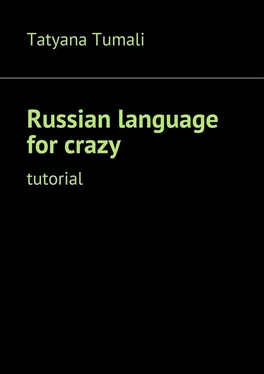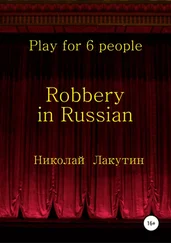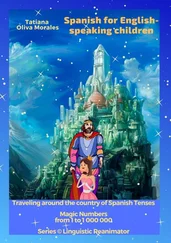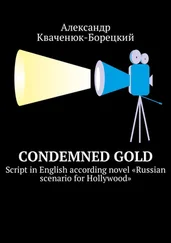Russian language for crazy
Tutorial
Tatyana Yakovlevna Tumali
Translator Ольга Чучукина
© Tatyana Yakovlevna Tumali, 2017
© Ольга Чучукина, translation, 2017
ISBN 978-5-4485-2777-7
Created with Ridero smart publishing system
Many foreigners who wish to learn Russian encounter the problem of searching a good textbook. To my mind, the textbooks that I had during my college years were very complicated and confusing to study Russian. Using them to learn Russian could be compared to my learning English at school for 6 years and at college for 2 years – I spent 8 years studying English, but I can say only a couple phrases for sure and one of them is “My name is Tatyana”. That’s pretty much all my knowledge of English. However, I have grade “A” in English in my college certificate. Possibly there are good textbooks to learn Russian but I haven’t met them yet.
What are the major differences characterizing my textbook? First, there is nothing more than necessary material, for example, phonetic exercises are excluded. Nowadays there are numerous websites that will teach you to read in Russian and help you with pronunciation.
Unlikely you will get rid of accent so don’t put too much effort in it. While speaking Russian with native speakers you will catch up in correct pronunciation. Second, you are going to study Russian grammar from the very first lesson even before you start speaking Russian. While studying this textbook you will learn the way of using tenses in Russian, correlation between verbal aspect and tense and understanding the cases of nouns or pronouns in relation to the verb.
There is a lot of tables in the textbook which will help you in studying language.
One more moment to which I’d like to pay your attention. There are phenomena in each language which are very difficult to explain. Sometimes native speakers don’t know why they speak so, instead of differently. Therefore the certain words and expressions are easier to learn and not to puzzle your brains why they are used so.
Why does the textbook have such strange title? The matter is that the people, wishing to learn Russian, seem a little bit crazy. Now when Russia is under the sanctions, when economy is in crisis, the idea of studying Russian is not the best somehow. But I am precisely assured that to speak Russian (as well as any other language however) is fine! And if you arrive to Russia sometime, find friends here
(the Russian friend – that’s cool!) and speak Russian with them by means of my textbook I shall be very glad.
Certainly, it would be quite good if someone helped you to study language, but nobody cancelled motivation-power. There would be a desire as Russians like to say.
А (a) Б (b) В (v) Г (g) Д (d) Е (jе) Ё (jo) Ж (ž) З (z) И (i) Й (j) К (k) Л (l) М (m) Н (n) О (о) П (p) Р (r) С (s) Т (t) У (u) Ф (f) Х (h) Ц (c) Ч (ch) Ш (sh) Щ (shch) Ъ ы (y) ь Э (e) Ю (ju) Я (ja)
Learning to read in Russian is not very difficult. We can say – it’s the easiest thing in Russian. Just put the sounds one by one. For example, мама (mama), идти (idti), знаю (znaju), купить (kupit’). Note the letter Ь, which softens the preceding consonant, but does not make sound itself. Therefore, at the end of the word “купить” it should be pronounced soft sound (T”). In the Internet (or in the You Tube) you can find a program and video that will teach you to read in Russian.
To learn foreign language, it is necessary to know the basic terms. Without them training is impossible. (Certainly, if you live in the Russian-speaking environment, communicate in Russian every day, it will not be a controlling factor). For those who has no such conditions, without terms it is impossible in any way.
The Gender (masculine, feminine, neuter)
The Stem
The Number (singular, plural)
The Ending
The Tense (the Past, the Present, the Future)
The Verbal aspect (imperfective, perfective)
The Infinitive
The Imperative mood (imperative)
The Case
The Subject
The Predicate
The Comparative degree
The Part of speech (a noun, an adjective, a verb, a pronoun, an adverb, the numeral, a participle, a preposition, a conjunction)
The Synonym
The Antonym
The Sound (soft, hard, unvoiced, voiced)
The Letter (vowel, consonant)
The Sentence
The Accent
The Conjugation
The Greeting and Farewell in Russian
The basic greetings in Russian:
Здравствуйте!(=zdrastvuyte) До свидания!(= do svidaniya) are used are used when addressed to strangers.
Привет!(=privet) Пока!(= poka) До завтра!(=do savtra)
До встречи!(=do fstrechi) – is used when addressed to friends.
– Как… зовут? (What is….name?) – Меня зовут Татьяна. (My name is Tatyana) – Очень приятно. (Nice to meet you). – Меня зовут … (My name is ……)
When this question is addressed to you, it contains the pronoun ВАС, in a reply ВАС is replaced by the pronoun МЕНЯ. When you want to know the name of another person, you should ask: – Как ЕГО (ЕЁ, ИХ) зовут? In a reply the pronoun doesn’t change:
Как его зовут? (What is his name?) – ЕГО зовут Иван. (HIS name is Ivan).
Как её зовут? (What is her name?) – ЕЁ зовут Оля. (HER name is Olya).
Как их зовут? (What are their names?) – ИХ зовут Олег и Наташа. (THEIR names are Oleg and Natasha).
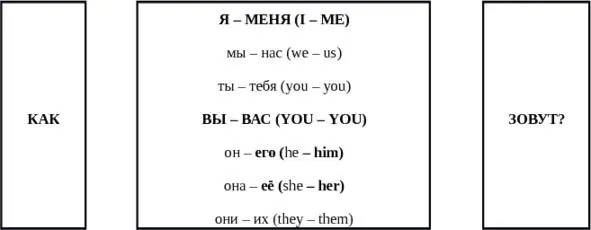
Answer the question:
Как вас зовут? Меня зовут…
Remember, that use of pronouns ты or вы depend on whom you address to.
“Как вас зовут?” You ask when referring to a stranger or to an adult. “Как тебя зовут?” one might ask a child only. For example, it would be indecent to ask an unknown girl: “Как тебя зовут?”. Girls do not beat you, of course, for such question -), but it is better not to ask so.
There are 3 genders of nouns in Russian. First they are should be learnt. The gender of a noun is determined very simply. When a noun ends in -A or -Я, then it is feminine. When a noun ends in -О or -Е, then it is neuter. All other nouns are masculine (except of папа, дедушка, дядя). Why do we need to know the gender of this or that noun? Noun’s ending varies in six cases in Russian – ((. And it doesn’t just vary, but varies in relation to the gender. Therefore, it is important to know the gender of a noun. It determines the choice of endings. When you just nominate an object or a person it is case 1 (nominative). In case 1 (nominative) the noun’s ending doesn’t change. For example, you say: Это телефон. Or you can ask: Это принтер? Это цветок?
When you want to know how an object is called in Russian, the correct question is: “Как это называется по-русски?” In reply you will hear, for example: “Это собака”.
Masculine gender – Feminine gender —А, -Я – Neuter gender – О, -Ё
Читать дальше
